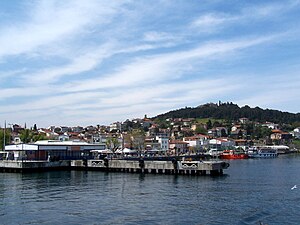
October, 1998
Sara is one of our family now, and she continues to grow as the island’s leaves thin out around us. The tangerines in our garden are coming out and the olive, cherry, and walnut trees have stopped providing us with bounty. There will be no more grapes, roses, or lion’s head flowers in our garden for quite some time. Meow Meow, who at the beginning of the summer “liberated” herself from being an indoor cat by leaping from our balcony 25 feet down to the garden below, now prefers to sleep by us on the couch, to purr and dream. Fewer enemy horses pass by to make her dive for cover. The island’s population is thinning out as well; the cell phone-wielding summer vacationers and most street barkers have left. Now it’s just the villagers, fishermen, navy soldiers, fayton drivers, some shopkeepers, and the Zerzevatci (“…ZVATCI!”) who comes by every once in a while to sell fruit on his horse and cart. They are starting to sell boza, the fermented millet winter drink often served with cinnamon, down by the docks. Our balcony, which used to be home to the Sunday parades of covered-headed women with makeup and macho men holding hands, now sits in view of the cleaning woman beating her rugs at the historic President Inonu mansion across the street. She waves to us like a fellow survivor. An evergreen. Our house doesn’t come with heat and I don’t know how well our space-heater will hold up.
This island’s feline permanent residents outside are beginning to sound desperate, and we hear them fighting at night. Those lucky enough to live at the bottom of the island near where the boats arrive still get fed by the fishermen, but the cats higher up rely on the good graces of the few humans left up here. I reflect on how spoiled our cats are, how they don’t know how good they have it. And I realize just how lucky I am too, and that I feel a real kinship not only with the Ladino-speaking Shlomos at the synagogue, but also with the Arabs coming out of the mosque who look just like them, and with the Greek villagers attending church every Sunday, and with the Kurds and the easterners at the Carsamba Pazari, and with the Turkish fishermen and fayton-drivers. Inside the island’s Greek Orthodox monastery, poor Turkish Moslems desperate for divine intervention fall on their knees before the icons and receiving their blessings from bearded priests. It was as if the terrible “relocation” of the 1920’s never happened, or the Islamic revolution weren’t taking place all around the world right now; as if, removed from the technology and speed of modern living, different peoples could coexist while preserving their respective traditions. And as I waited for the next amplified call-to-prayer, and listened for the increasingly-intermittent cries of the Zerzevatci, and went down to check out the fishermen’s catch and buy fresh bread, what I wanted to do most of all was to stop time, to preserve this season, and to spot the glorious nasal cartilage of an endangered Shlomo, to save the island from foreign companies like Nestle coming to Heybeliada to put strawberries in the yoghurt, and to luxuriate, for a moment, in the thick golden kaymak cream at the top.
